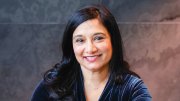Responding to a traumatic year of events that divided alumni and students alike, new Harvard Alumni Association (HAA) president Moitri Chowdhury Savard ’93 hopes to bring the community together through veritates. This Latin plural for “truths”—a variation on Harvard’s motto—captures “the many shades of gray” reflecting disparate voices, she says. “We have to simultaneously hold multiple truths and come together as a society to coalesce around values, particularly freedom of thought and expression.”
She’s referring to “everything that’s gone on on the world stage since October,” when Hamas-led militants attacked Israel, plus the political atmosphere preceding the upcoming presidential election. “We really have seen that it’s been a difficult time for higher education and for campuses,” Savard explains, “and for constructive conversations: to have dissent without being nasty.” To that end, the HAA has been “working on leadership skills, including public narrative,” preparing its volunteers to engage in difficult conversations within the larger alumni community because “bringing alumni voices to Cambridge is essential during this divisive time,” she adds. The HAA is also examining its own culture, and that of the board of directors, to ensure that “all voices are being heard” and there’s “transparency around decision-making.”
Savard, a family physician in New York City (where she lives with her husband, a pediatric anesthesiologist, and two children), is well-positioned to take a holistic approach to her role. As the medical director and assistant clinical professor at the Long Island Center of Weill Cornell Medicine, she integrates healing therapies and allopathic medicine with traditional medical care. And for her, listening to outlying voices comes naturally. “My parents and I came to the U.S. from India in the early 1970s. My father had $8 in his pocket and a letter of reference from an employer overseas,” she recalls. “Far from the people and customs my parents had known their entire lives, adjusting to their new home did not always come easily.” Their “perseverance and sacrifices” enabled her to attend Harvard, where she concentrated in economics and in Indian studies, working with Lamont University Professor Amartya Sen on a study about determinants of fertility in India. She had planned on a career in development economics: “Harvard gave me the opportunity to explore that,” she says, “and then completely pivot.”
That shift began with a formative experience: the First-Year Outdoor Program (FOP). Having grown up in the New York metropolitan area, she had not spent much time in the wilderness. The program was so enjoyable that she became a FOP leader. And because Harvard subsidized FOP leaders to become emergency medical technicians, she took a course in wilderness medicine. She later “worked as an ambulance third rider with Bellevue Hospital in New York—and was hooked” on pursuing a medical career. After graduation she was a city-funded New York City Urban Fellow (a nine-month program exploring urban issues and leadership) and worked as an assistant to the city liaison to the United Nations, then took a job in healthcare consulting while applying to medical school, ultimately graduating from the State University of New York at Stony Brook.
Public service is another theme in Savard’s life and work. She was a Lamont public service fellow at Harvard and was inspired to support a summer fellowship in her parents’ name for students pursuing similar roles. “Harvard emphasizes service to one’s community and civic engagement in its commitment to producing citizen leaders in society,” she says. “I have brought that ethic into my life through my volunteer work in my local community and not-for-profit board service.”
That helped motivate her to become an HAA volunteer, as an alumni interviewer, although her initial attachment to Harvard grew as an undergraduate. Returning from a semester abroad studying in India, she realized “there were so many people I wanted to get to know and so little time left.” Savard ran for Radcliffe’s First Class Marshal, was elected, and has since worked to bring “my awesome classmates” to their last six reunions. Once her children were old enough, she stepped up her involvement with the HAA. There, she has found the value in promoting diverse voices while working on common goals. “We will not all agree but mutual respect in disagreement is essential,” she says. “Dialogue across differences is the way to move forward.”




